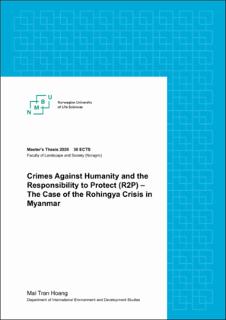| dc.contributor.advisor | Glaab, Katharina Charlotte Laura | |
| dc.contributor.author | Hoang, Mai Tran | |
| dc.coverage.spatial | Myanmar | en_US |
| dc.date.accessioned | 2021-02-25T13:40:02Z | |
| dc.date.available | 2021-02-25T13:40:02Z | |
| dc.date.issued | 2020 | |
| dc.identifier.uri | https://hdl.handle.net/11250/2730464 | |
| dc.description.abstract | The latest Rohingya crisis that broke out after the attacks on police outposts by the Arakan Rohingya Salvation Army (ARSA) in Rakhine State in Myanmar, shows a devastating event deriving from a long history of abuses against a minority group which has been neglected and eventually stripped of their citizenship rights. The United Nations principle of the Responsibility to Protect (R2P) were raised from the International Commission of State Sovereignty report and adopted as a global concept at the 2005 World Summit. The challenge remain that the principle is mistaken to be a hidden agenda of modern-day imperialism and for regime change. At the international level, it is becoming more and more evident that the Rohingya crisis has proved to be a failed subject of the responsibility to protect. The world is witnessing another ethnic minority group becoming victims to crimes against humanity committed by the state institution that were originally created to protect them. Security forces from the Myanmar Government are accused of being the perpetrators executing these horrific atrocities in Rakhine state, but it is effectively the responsibility from the UN Council Members who have failed to stop the crimes that keeps add the growing numbers of refugees crossing the borders to Bangladesh. The thesis will look at five the pre-selected UN Security Council meeting records between 2017 and 2018. The analysis went through each statements from both UN Security Council permanent and non-permanent members and found six recurring themes: the lack of basic human rights, the restricted access for humanitarian agencies to enter remote Rakhine state, growing sense of concern for regional security and instability, the difficulty of reaching a satisfactory repatriation process, the fear and blame of terrorism as the cause of conflict, and lastly, the pressure to hold perpetrators from Myanmar accountable for their crimes against humanity. | en_US |
| dc.language.iso | eng | en_US |
| dc.publisher | Norwegian University of Life Sciences, Ås | en_US |
| dc.rights | Attribution-NonCommercial-NoDerivatives 4.0 Internasjonal | * |
| dc.rights.uri | http://creativecommons.org/licenses/by-nc-nd/4.0/deed.no | * |
| dc.subject | Rohingya | en_US |
| dc.subject | United Nations Security Council | en_US |
| dc.title | Crimes against humanity and the responsibility to protect : the case of the Rohingya crisis in Myanmar | en_US |
| dc.type | Master thesis | en_US |
| dc.description.localcode | M-IR | en_US |

